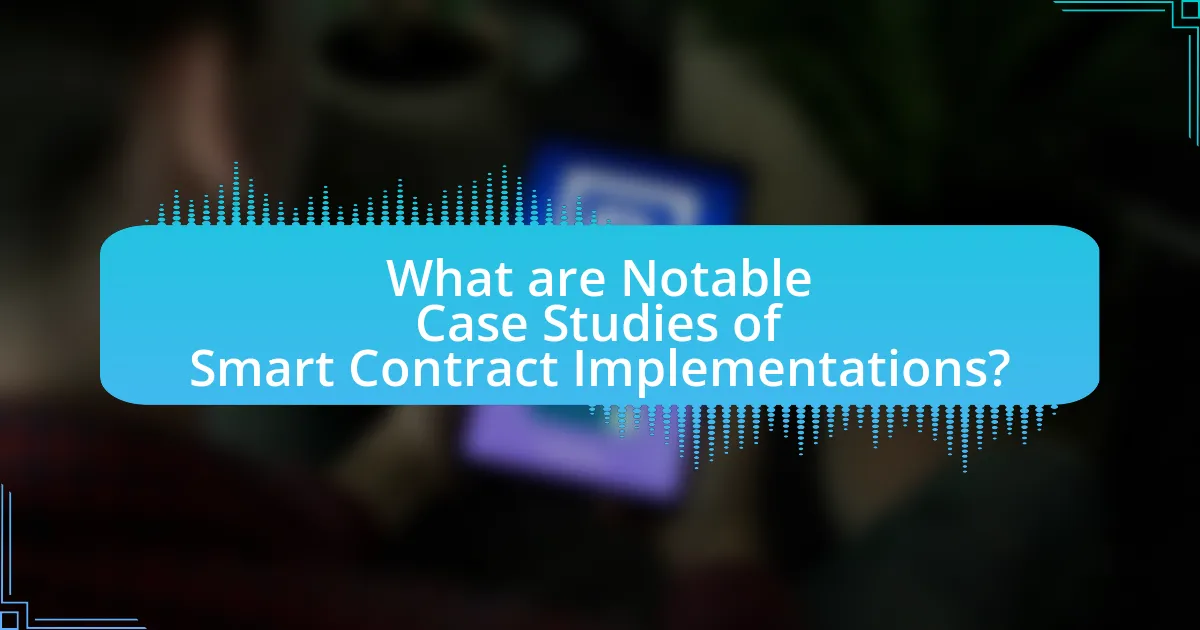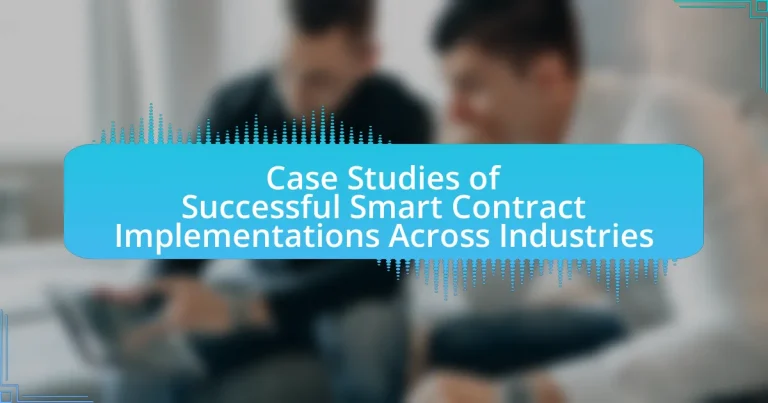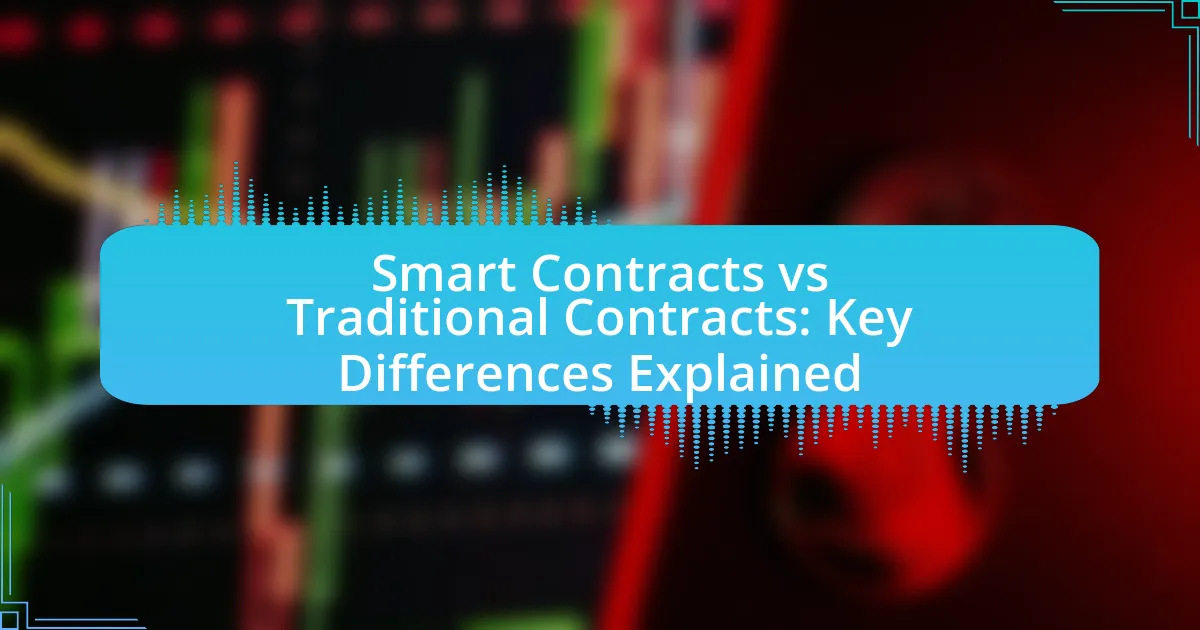Smart contracts are self-executing agreements with terms encoded in software, facilitating automated transactions on blockchain platforms. This article examines notable case studies of successful smart contract implementations across various industries, highlighting their impact on efficiency, cost reduction, and transparency. Key sectors discussed include finance, supply chain management, and real estate, showcasing how smart contracts streamline processes, enhance traceability, and improve security. The article also addresses the challenges faced during implementation, best practices for integration, and metrics for evaluating performance, providing a comprehensive overview of the transformative potential of smart contracts in modern business operations.

What are Smart Contracts and Their Importance in Various Industries?
Smart contracts are self-executing contracts with the terms of the agreement directly written into code, enabling automated and trustless transactions on blockchain platforms. Their importance spans various industries, as they enhance efficiency, reduce costs, and minimize the need for intermediaries. For instance, in the financial sector, smart contracts facilitate faster settlement times and lower transaction fees by automating processes like trade execution and payment settlements. In supply chain management, they improve transparency and traceability, allowing stakeholders to track goods in real-time and verify compliance with contractual obligations. Additionally, the real estate industry benefits from smart contracts by streamlining property transactions, reducing fraud, and ensuring secure and transparent transfers of ownership. These applications demonstrate how smart contracts can revolutionize traditional practices across multiple sectors by leveraging blockchain technology for enhanced security and efficiency.
How do Smart Contracts function in different sectors?
Smart contracts function by automating and enforcing agreements through self-executing code on blockchain platforms across various sectors. In the financial sector, smart contracts facilitate automated transactions, reducing the need for intermediaries, as seen in decentralized finance (DeFi) applications that enable peer-to-peer lending and trading. In supply chain management, smart contracts enhance transparency and traceability by automatically verifying and recording each step of the product journey, exemplified by IBM’s Food Trust blockchain, which tracks food products from farm to table. In real estate, smart contracts streamline property transactions by automating escrow processes and title transfers, as demonstrated by Propy, which allows buyers and sellers to complete transactions online securely. In healthcare, smart contracts manage patient consent and data sharing, improving data integrity and security, as evidenced by projects like MedRec, which utilizes blockchain to manage medical records. These implementations illustrate how smart contracts enhance efficiency, reduce costs, and increase trust across diverse industries.
What are the key components of Smart Contracts?
The key components of smart contracts include code, execution environment, and the blockchain network. The code defines the rules and conditions of the contract, typically written in programming languages like Solidity. The execution environment, often a virtual machine, processes the contract’s code when conditions are met. The blockchain network provides a decentralized and immutable ledger that ensures transparency and security, allowing all parties to verify the contract’s execution without intermediaries. These components work together to facilitate automated, trustless transactions across various industries.
How do Smart Contracts ensure security and transparency?
Smart contracts ensure security and transparency through their immutable nature and decentralized execution on blockchain technology. Once deployed, smart contracts cannot be altered, which prevents tampering and fraud. Additionally, all transactions and contract terms are recorded on a public ledger, allowing any participant to verify the contract’s execution and outcomes. This transparency is further enhanced by the use of cryptographic techniques that secure the data and ensure that only authorized parties can interact with the contract. The combination of immutability, decentralization, and cryptographic security mechanisms establishes a trustless environment where parties can engage without the need for intermediaries.
What advantages do Smart Contracts provide to businesses?
Smart contracts provide businesses with enhanced efficiency, reduced costs, and increased transparency. By automating processes through self-executing contracts, businesses can eliminate the need for intermediaries, which streamlines operations and minimizes transaction times. For instance, a study by the World Economic Forum estimates that smart contracts could reduce transaction costs by up to 30% in certain industries. Additionally, the immutable nature of blockchain technology ensures that all parties have access to the same information, fostering trust and accountability. This transparency can lead to improved compliance and reduced fraud, as all transactions are recorded and verifiable.
How do Smart Contracts reduce operational costs?
Smart contracts reduce operational costs by automating processes and eliminating the need for intermediaries. This automation streamlines transactions, reduces human error, and accelerates execution times, leading to significant cost savings. For instance, a study by Deloitte found that smart contracts can reduce transaction costs by up to 30% in supply chain management by minimizing paperwork and manual processing. Additionally, the transparency and security provided by blockchain technology further decrease the costs associated with fraud and disputes, reinforcing the financial efficiency of smart contracts in various industries.
What impact do Smart Contracts have on transaction speed?
Smart contracts significantly enhance transaction speed by automating processes and eliminating intermediaries. This automation allows transactions to be executed instantly upon meeting predefined conditions, reducing the time typically required for manual approvals and processing. For instance, in the financial sector, smart contracts can facilitate real-time settlements, which traditionally take days, thereby streamlining operations and improving efficiency. According to a report by the World Economic Forum, smart contracts can reduce transaction times from days to minutes, demonstrating their profound impact on transaction speed across various industries.

What are Notable Case Studies of Smart Contract Implementations?
Notable case studies of smart contract implementations include the Ethereum-based project, DAO (Decentralized Autonomous Organization), which raised over $150 million in 2016 before a hack led to a controversial hard fork. Another significant example is the use of smart contracts in supply chain management by IBM and Maersk, which streamlined shipping processes and reduced costs by automating documentation and tracking. Additionally, the insurance industry has seen implementations like Etherisc, which offers decentralized flight delay insurance, allowing for automatic payouts based on flight data. These cases demonstrate the versatility and impact of smart contracts across various sectors.
How has the financial industry utilized Smart Contracts?
The financial industry has utilized smart contracts primarily to automate and streamline processes such as trade settlements, loan agreements, and insurance claims. By leveraging blockchain technology, financial institutions can execute transactions automatically when predefined conditions are met, reducing the need for intermediaries and minimizing the risk of fraud. For instance, in 2020, the DeFi platform Aave implemented smart contracts to facilitate decentralized lending and borrowing, allowing users to earn interest on their crypto assets without traditional banks. This approach not only enhances efficiency but also increases transparency and security in financial transactions.
What specific examples demonstrate success in finance?
Specific examples that demonstrate success in finance include the implementation of smart contracts in decentralized finance (DeFi) platforms like Uniswap and Aave. Uniswap, a decentralized exchange, utilizes smart contracts to automate trading and liquidity provision, resulting in over $1 trillion in trading volume since its launch in 2018. Aave, a lending protocol, employs smart contracts to facilitate peer-to-peer lending, allowing users to earn interest on deposits and borrow assets without intermediaries, which has led to over $15 billion in total value locked as of 2023. These examples illustrate how smart contracts enhance efficiency, reduce costs, and increase accessibility in financial services.
What challenges were faced during implementation in finance?
Challenges faced during implementation in finance included regulatory compliance, integration with legacy systems, and security concerns. Regulatory compliance posed significant hurdles as financial institutions had to navigate complex legal frameworks that vary by jurisdiction, often delaying project timelines. Integration with legacy systems was another challenge, as many financial organizations relied on outdated technology that was not compatible with new smart contract solutions, leading to increased costs and implementation difficulties. Security concerns were paramount, as the financial sector is a prime target for cyberattacks, necessitating robust security measures to protect sensitive data and maintain trust. These challenges highlight the complexities involved in adopting innovative technologies within the finance industry.
In what ways have Smart Contracts transformed supply chain management?
Smart contracts have transformed supply chain management by automating processes, enhancing transparency, and reducing costs. Automation through smart contracts minimizes human intervention, which accelerates transactions and reduces errors. For instance, when conditions are met, payments are automatically executed, streamlining the payment process. Enhanced transparency is achieved as all parties have access to the same data on a decentralized ledger, which fosters trust and accountability. According to a report by the World Economic Forum, the implementation of blockchain and smart contracts in supply chains can reduce administrative costs by up to 30%. Additionally, smart contracts facilitate real-time tracking of goods, improving inventory management and reducing delays. These transformations lead to increased efficiency and reliability in supply chain operations.
What are the key case studies in supply chain applications?
Key case studies in supply chain applications include Walmart’s use of blockchain for food traceability, which improved transparency and reduced the time to trace produce from six days to mere seconds. Another significant case is Maersk’s collaboration with IBM to create TradeLens, a blockchain platform that enhances visibility and efficiency in global shipping, resulting in reduced paperwork and faster transactions. Additionally, Unilever has implemented smart contracts to streamline supplier payments, leading to improved cash flow and reduced transaction costs. These examples demonstrate the effectiveness of innovative technologies in optimizing supply chain processes.
How do Smart Contracts enhance traceability in supply chains?
Smart contracts enhance traceability in supply chains by automating and recording transactions on a blockchain, which provides an immutable and transparent ledger. This technology allows all parties involved in the supply chain to access real-time data regarding the movement and status of goods, ensuring that every transaction is securely documented and easily verifiable. For instance, a study by Accenture found that using blockchain technology, including smart contracts, can reduce supply chain fraud by up to 50% and improve the accuracy of inventory management. This level of transparency and accountability significantly increases trust among stakeholders and facilitates quicker responses to any discrepancies or issues that may arise.

What Lessons Can Be Learned from Successful Smart Contract Implementations?
Successful smart contract implementations demonstrate the importance of clarity in contract terms and robust testing protocols. Clear definitions of roles, responsibilities, and conditions within the smart contract minimize disputes and enhance trust among parties. For instance, the implementation of smart contracts in supply chain management by companies like IBM and Maersk has shown that precise terms lead to improved transparency and efficiency, reducing delays and errors. Additionally, rigorous testing before deployment, as seen in projects like Ethereum’s DAO, highlights the necessity of identifying vulnerabilities to prevent costly exploits. These lessons emphasize that well-defined agreements and thorough testing are critical for the success of smart contracts across various industries.
What best practices emerge from these case studies?
Best practices that emerge from case studies of successful smart contract implementations across industries include thorough stakeholder engagement, clear definition of contract terms, and robust testing protocols. Stakeholder engagement ensures that all parties understand their roles and responsibilities, which minimizes disputes and enhances collaboration. Clear definition of contract terms is crucial for preventing ambiguities that could lead to misinterpretations; for instance, specifying conditions for execution and penalties for non-compliance can streamline processes. Robust testing protocols, including simulations and audits, help identify vulnerabilities and ensure the smart contract functions as intended before deployment. These practices have been validated by various implementations, such as the use of smart contracts in supply chain management, where clarity and stakeholder alignment significantly improved efficiency and reduced errors.
How can businesses effectively integrate Smart Contracts?
Businesses can effectively integrate Smart Contracts by identifying specific use cases that enhance efficiency and transparency in their operations. For instance, companies can automate supply chain processes by using Smart Contracts to trigger payments upon the delivery of goods, thereby reducing delays and disputes. A notable example is IBM’s Food Trust blockchain, which utilizes Smart Contracts to track food products from farm to table, ensuring transparency and safety in the food supply chain. This integration not only streamlines operations but also builds trust among stakeholders, as all parties can verify transactions in real-time.
What common pitfalls should be avoided in Smart Contract projects?
Common pitfalls to avoid in Smart Contract projects include inadequate testing, lack of security audits, and poor documentation. Inadequate testing can lead to vulnerabilities that may be exploited, as evidenced by the DAO hack in 2016, where a flaw in the smart contract code resulted in the loss of $60 million. Lack of security audits can leave contracts open to attacks; for instance, the Parity wallet hack in 2017 occurred due to unaddressed vulnerabilities. Poor documentation can hinder future development and maintenance, making it difficult for teams to understand the contract’s functionality and logic. These pitfalls can significantly impact the success and security of Smart Contract implementations.
How can organizations measure the success of Smart Contract implementations?
Organizations can measure the success of Smart Contract implementations by evaluating key performance indicators (KPIs) such as transaction speed, cost savings, error reduction, and user satisfaction. For instance, a study by Deloitte found that companies utilizing Smart Contracts experienced a 30% reduction in transaction costs and a significant decrease in processing time, demonstrating efficiency gains. Additionally, organizations can assess the level of automation achieved and the extent to which Smart Contracts have minimized disputes, as evidenced by a report from the World Economic Forum, which highlighted that Smart Contracts can reduce disputes by up to 80% in certain applications. These metrics provide concrete evidence of the effectiveness and impact of Smart Contract implementations.
What metrics are most effective for evaluating Smart Contract performance?
The most effective metrics for evaluating Smart Contract performance include transaction throughput, latency, gas efficiency, and security vulnerabilities. Transaction throughput measures the number of transactions processed per second, indicating the scalability of the Smart Contract. Latency assesses the time taken to execute a transaction, which impacts user experience. Gas efficiency evaluates the cost-effectiveness of executing Smart Contracts on platforms like Ethereum, where gas fees can significantly affect overall performance. Lastly, identifying security vulnerabilities through audits and testing ensures the Smart Contract operates safely and reliably, as evidenced by incidents like the DAO hack in 2016, which highlighted the importance of security in Smart Contract evaluations.
How can feedback be utilized to improve future Smart Contract projects?
Feedback can be utilized to improve future Smart Contract projects by systematically analyzing user experiences and identifying areas for enhancement. This process involves collecting feedback through surveys, user testing, and performance metrics, which can reveal specific issues such as security vulnerabilities, usability challenges, or inefficiencies in contract execution. For instance, the Ethereum network has implemented feedback mechanisms that led to significant upgrades, such as the transition to Ethereum 2.0, which addressed scalability and energy consumption concerns based on user input. By integrating this feedback into the development cycle, teams can prioritize features and fixes that directly respond to user needs, ultimately leading to more robust and user-friendly Smart Contracts.
















